![Intolerance (Loves struggle throughout the ages) [Masters of Cinema] (1916) (Blu-ray)](/pictures/1133260.jpg) Intolerance (Loves struggle throughout the ages) | Blu Ray | (08/12/2014)
from £11.45
| Saving you £8.54 (74.59%)
| RRP
Intolerance (Loves struggle throughout the ages) | Blu Ray | (08/12/2014)
from £11.45
| Saving you £8.54 (74.59%)
| RRP A fter shaking the world with his hugely controversial epic The Birth of a Nation pioneer filmmaker D. W. Griffith spared no expense in putting together his next project Intolerance (Love’s struggle throughout the ages): a powerful examination of intolerance as it has persisted throughout civilisation set across four parallel storylines that span 2500 years. There is the Babylonian story depicting nothing less than the fall of Babylon; the Judean story which revolves around the crucifixion of Christ; the French story which presents the St. Bartholomew's Day Massacre in all its horror; and a modern American story of class struggle crime and the plight of life in the early 20th century set within urban slums and the prison system. Starring such luminaries as Lillian Gish Constance Talmadge and Miriam Cooper who share screentime with an enormous main cast and some 3 000 extras Griffith's film — the most expensive motion picture ever produced at the time — went on to become a critical success whose influence has only grown in the decades since. The Masters of Cinema Series are proud to present the 2013 restoration of Kevin Brownlow's and David Gill's preserved Intolerance featuring Carl Davis's orchestral score for the first time on Blu-ray in the UK. Bonus Features: New high-definition 1080p presentation of the acclaimed Brownlow and Gill Thames Silents restoration of the film. Orchestral score by the esteemed composer Carl Davis • Two feature-length films by Griffith that act as companion pieces to Intolerance and take their material from the main film: The Fall of Babylon and The Mother and the Law accompanied by new scores by the Mont Alto Motion Picture Orchestra. Three Hours That Shook the World: Observations on 'Intolerance' a 2013 documentary featuring preservationist Kevin Brownlow discussing the film. 56-PAGE BOOKLET filled with vintage and modern reports reflections and essays on the film.
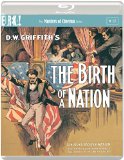 BIRTH OF A NATION, THE (Masters of Cinema) (BLU-RAY) | Blu Ray | (29/07/2013)
from £N/A
| Saving you £N/A (N/A%)
| RRP
BIRTH OF A NATION, THE (Masters of Cinema) (BLU-RAY) | Blu Ray | (29/07/2013)
from £N/A
| Saving you £N/A (N/A%)
| RRP One of the most artistically significant and controversial motion pictures ever made D. W. Griffith's silent epic The Birth of a Nation was a massive commercial success at the time of its release owing to its dynamic storytelling and its breakthrough developments in cinema language that have become common traits of practically every film that has since followed. However the picture's legacy is one that continues to elicit outrage over its vulgar depictions of African-Americans and its deceptive historiography of the United States in the second half of the nineteenth century. The Birth of a Nation begins depicting the amiable relationship between two families Northern and Southern and the way in which the impending Civil War intensifies the conflict of their worldviews. Following the end of the war and the assassination of President Lincoln a lawless chaos courses throughout the Reconstruction South and the Ku Klux Klan is formed to take on a rising black militia and impose a vengeful vigilante justice across their land and birthright. It's a film that's deeply divisive even to the senses of a single viewer: images of painterly beauty in composition and tonal quality often exhibit a contemptuous inflammatory coarseness with regard to subject matter; just as frequently long tracts evince an innocent terrifically lyrical grandeur. Griffith would attempt to make amends for the moral schism of this schizophrenic epic in his next film Intolerance but The Birth of a Nation cannot - and should not - remain unseen or undiscussed: it is a great and terrible masterpiece. The Masters of Cinema Series releases Griffith's three-hour epic including a series of the director's Civil War shorts for the first time on Blu-ray in the UK. Special Features: New 1080p presentation (on the Blu-ray) of the film from archival 35mm elements in its original aspect ratio Music by the Mont Alto Motion Picture Orchestra in 2.0 stereo and DTS-HD Master Audio 5.1 Short archival introductions to the film by D. W. Griffith and Walter Huston Newly rediscovered original intermission sequence and 1930 re-release title sequence Seven Civil War shorts directed by Griffith: In the Border States (1910); The House with Closed Shutters (1910); The Fugitive (1910); His Trust (1910); His Trust Fulfilled (1910); Swords and Hearts (1911); and The Battle (1911). A lengthy booklet with writing about the film rare archival imagery and more.
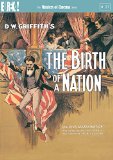 BIRTH OF A NATION, THE (Masters of Cinema) (DVD) | DVD | (29/07/2013)
from £N/A
| Saving you £N/A (N/A%)
| RRP
BIRTH OF A NATION, THE (Masters of Cinema) (DVD) | DVD | (29/07/2013)
from £N/A
| Saving you £N/A (N/A%)
| RRP One of the most artistically significant and controversial motion pictures ever made D. W. Griffith's silent epic The Birth of a Nation was a massive commercial success at the time of its release owing to its dynamic storytelling and its breakthrough developments in cinema language that have become common traits of practically every film that has since followed. However the picture's legacy is one that continues to elicit outrage over its vulgar depictions of African-Americans and its deceptive historiography of the United States in the second half of the nineteenth century. The Birth of a Nation begins depicting the amiable relationship between two families Northern and Southern and the way in which the impending Civil War intensifies the conflict of their worldviews. Following the end of the war and the assassination of President Lincoln a lawless chaos courses throughout the Reconstruction South and the Ku Klux Klan is formed to take on a rising black militia and impose a vengeful vigilante justice across their land and birthright. It's a film that's deeply divisive even to the senses of a single viewer: images of painterly beauty in composition and tonal quality often exhibit a contemptuous inflammatory coarseness with regard to subject matter; just as frequently long tracts evince an innocent terrifically lyrical grandeur. Griffith would attempt to make amends for the moral schism of this schizophrenic epic in his next film Intolerance but The Birth of a Nation cannot - and should not - remain unseen or undiscussed: it is a great and terrible masterpiece. The Masters of Cinema Series releases Griffith's three-hour epic including a series of the director's Civil War shorts for the first time on Blu-ray in the UK.
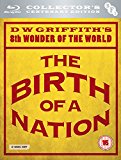 Birth of a Nation (Centenary Edition) Blu-ray | Blu Ray | (23/11/2015)
from £25.65
| Saving you £4.34 (16.92%)
| RRP
Birth of a Nation (Centenary Edition) Blu-ray | Blu Ray | (23/11/2015)
from £25.65
| Saving you £4.34 (16.92%)
| RRP 2015 marks the centenary of the release of the controversial, yet extremely significant American silent epic, The Birth of a Nation, by D.W. Griffith. Griffith is often considered to be one of the most important figures in the history of cinema having been credited with creating and perfecting cinematic devices such as the flash-back, the iris shot, the mask and cross-cutting. The Birth of a Nation covers a period of several years and is centered on the relationship of two families during the Civil War and Reconstruction-US era. Dividing friends and destroying families, The Civil War is minor in its disruption compared to the anarchy which follows in the black-ruled South post-war. The film was released to great commercial success, being one of the highest grossing films of the Silent era, but was widely-debated and often condemned due to its portrayal of the Ku Klux Klan as a heroic force. The film is attributed to launching the career of Lillian Gish, who worked closely with Griffith for many years, and who was also known as ‘The First Lady of American Cinema’. Extras: Two short films by D W Griffith; The Rose of Kentucky (1911) and The Coward (1911) The Drummer of the 8th (1913) – short film starring future Oscar winning Frank Borzage (A Farewell to Arms) Stolen Glory (1912) – a comedy starring Ford Sterling filmed against the backdrop of a parade of Union Civil War veterans 1930 re-release title sequence and short archival introduction by D W Griffith Photoplay orchestral recording sessions Out-takes and original camera tests D W Griffith on Lux Radio Theatre BFI Southbank roundtable discussion (2015) A Personal Appreciation of Birth of a Nation by film scholar Melvyn Stokes Fully illustrated booklet with news essays and full credits
![Broken Blossoms [1919]](/pictures/1013234.jpg) Broken Blossoms | DVD | (16/10/2001)
from £26.98
| Saving you £-6.99 (N/A%)
| RRP
Broken Blossoms | DVD | (16/10/2001)
from £26.98
| Saving you £-6.99 (N/A%)
| RRP A Chinese man visits London in the hope that he can bring the message of Buddha to others. He falls in love with the daughter of a prize fighter and cares for her when she is beaten. Their friendship is to prove fateful... Silent with the original 1919 orchestral score by Louis F. Gottschalk.
![The Sky's The Limit [DVD]](/pictures/1103751.jpg) The Sky's The Limit | DVD | (04/10/2010)
from £13.81
| Saving you £-0.82 (N/A%)
| RRP
The Sky's The Limit | DVD | (04/10/2010)
from £13.81
| Saving you £-0.82 (N/A%)
| RRP One of Fred Astaire's least known but double Oscar nominated dance movies features Fred performing his legendary breaking glass dance routine. Fred Atwell (Fred Astaire) is a decorated Air Force pilot home on leave and expected to act as a cardboard hero for a morale-boosting tour of his Flying Tiger squadron. Bored by the whole affair however Fred takes off his uniform and goes incognito in New York for a few days bumping into Joan Mannion (Joan Leslie) a bright-eyed photographer who sings and dances. Determined to win over the girl for what he is and not his reputation Fred allows Joan to think he's a waster who doesn't want to serve his country. Naturally Joan wants nothing to do with this shirker but then she sees him dance...
![The Birth Of A Nation [1915]](/pictures/1013265.jpg) The Birth Of A Nation | DVD | (02/10/2000)
from £N/A
| Saving you £N/A (N/A%)
| RRP
The Birth Of A Nation | DVD | (02/10/2000)
from £N/A
| Saving you £N/A (N/A%)
| RRP Based on a play called 'The Clansman' this film was billed as 'the first feature film' and caused riots on its release because of its racist overtones. The film follows a family through the American Civil war. Includes 'The Making Of...' Silent. Tinted Version.
![Intolerance [1916]](/pictures/1013198.jpg) Intolerance | DVD | (27/12/2000)
from £20.00
| Saving you £-0.01 (N/A%)
| RRP
Intolerance | DVD | (27/12/2000)
from £20.00
| Saving you £-0.01 (N/A%)
| RRP Intolerance is considered the greatest film of the silent era and may well be the greatest film ever made. It has gained this reputation due to its influence on other filmmakers an influence that has become film grammar itself. The man behind the film D.W. Griffith is the acknowledged master of cinematic storytelling the first American director to elevate the movies to the level of serious art. More than 50 years after Griffith's death there is little question of the brillian
![Sally Of The Sawdust [1925]](/pictures/1012904.jpg) Sally Of The Sawdust | DVD | (28/01/2002)
from £N/A
| Saving you £N/A (N/A%)
| RRP
Sally Of The Sawdust | DVD | (28/01/2002)
from £N/A
| Saving you £N/A (N/A%)
| RRP In a fascinating departure from the austere moral drama in which he specialized D.W Griffith demonstrates his talents for warm-hearted comedy in Sally of the Sawdust. W.C. Fields made his third screen appearance as Professor Eustace McGargle a lovable confidence man who becomes the unlikely guardian of an orphaned circus waif (Carol Dempster). Intending to return Sally to her grandparents McGargle learns that her wealthy and esteemed grandfather (Erville Alderson) is a stern ju
![D.W. Griffith - Monumental Epics [1915]](/pictures/1012781.jpg) D.W. Griffith - Monumental Epics | DVD | (24/06/2002)
from £N/A
| Saving you £N/A (N/A%)
| RRP
D.W. Griffith - Monumental Epics | DVD | (24/06/2002)
from £N/A
| Saving you £N/A (N/A%)
| RRP Theres little doubt that much of what we now take for granted about cinema owes much to the vision of director D W Griffith. Monumental Epics collects five of his most influential silent masterpieces. The Birth of a Nation (1915) is also the birth of the epic film. Made to commemorate the 50th anniversary of the end of the American Civil War this provocative film unflinchingly shows the humiliation of Southern culture, the "heroism" of the Ku Klux Klan, and links the Union and Confederacy by a common Aryan birthright. All of which has to be viewed in its period context if it is to be viewed at all. Intolerance (1916) is film-making of epic complexity. Human intolerance is related through a modern tale of wrongful conviction, intercut by three stories from Babylonian, Judean, and French history to point up the issue through the ages. The intricacy of the intercutting is breathtaking even now, but those as confused as the first audiences evidently were can opt to see each story separately. Sensitively tinted, this is Griffith's finest three hours. Broken Blossoms (1919) has Griffith venturing into domestic melodrama. Although there's a clear moral to be drawn from this tale of compassion in the face of ignorance and brutality, neither the over-acting of Lillian Gish and Donald Crisp, nor the vein of sentimentality that creeps into their characters' relationship allow the viewer to forget the period-piece nature of the film. Here an appropriately expressive musical score helps keep viewing at an attentive level. Way Down East (1920) shows Griffith moving from the epic to the personal, though still on a large scale. The combining of old-style melodrama with latter-day female emancipation is tellingly brought off, and Lillian Gish excels as the country girl used and abused by male society, until "rescued" by a farmer of true moral scruples. Unconvinced? Then go straight to the climactic snowstorm and ice floe sequences--Eisenstein et al are inconceivable without this as trailblazer. Abraham Lincoln (1930) marked Griffith's entry into the talkie era. Tautly directed, it offers a historically accurate account of the 16th US President's rise to power and his visionary outlook on American society. Civil War scenes are implied rather than enacted, and its Walter Huston's robust yet understated acting that carries the day, with sterling support from Una Merkel as Ann Rutledge and Hobart Bosworth as General Lee. On the DVD: Stylishly packaged, restoration and digital remastering has been carried out to Eureka's usual high standard, and the 4:3 aspect ratio has commendable clarity. Birth of a Nation has Joseph Carl Breil's original orchestral score and a pithy "making of" film by Russell Merritt. Intolerance contains a useful rolling commentary and a great wurlitzer soundtrack too. Way Down East includes a commentary. Abraham Lincoln also has a commentary, though Hugo Riesenfeld's score often verges on the mawkish. Overall this set is a must for anyone remotely interested in film as a living medium.--Richard Whitehouse
![Abraham Lincoln [DVD]](/pictures/1102125.jpg) Abraham Lincoln | DVD | (12/07/2010)
from £17.62
| Saving you £-14.37 (N/A%)
| RRP
Abraham Lincoln | DVD | (12/07/2010)
from £17.62
| Saving you £-14.37 (N/A%)
| RRP Abraham Lincoln was D.W. Griffith's first foray into the realm of 'talkies'. Following the life loves and tribulations of Abraham Lincoln (Walter Huston) including his career as a lawyer the film also includes his successful run for Presidency the second term in office and his assassination at the Ford Theatre. Often perceived as an eccentric by his contemporaries Lincoln moves through each cataclysmic event with an almost saintly calmness and grace...
![Way Down East [1920]](/pictures/1013119.jpg) Way Down East | DVD | (07/05/2001)
from £N/A
| Saving you £N/A (N/A%)
| RRP
Way Down East | DVD | (07/05/2001)
from £N/A
| Saving you £N/A (N/A%)
| RRP Way Down East was the most successful film of the 1920s, even more so than the original versions of Ben-Hur or The Ten Commandments. That says much about tastes and values of the day, since this is no visually spectacular epic designed to wow audiences: director DW Griffith gave it the subtitle "A Simple Story of Plain People". The story follows impoverished New England country girl Anna Moore (Lillian Gish) to Boston in search of family aid. Instead she's duped into a fake marriage by playboy Lennox Sanderson (Lowell Sherman). Pregnancy forces Sanderson to abandon her to care for the child alone, which dies soon after birth. The disgrace sends her back into the countryside to work for Squire Bartlett, whose son David (Richard Barthelmess) begins to fall for her. But the dreadful secret threatens to be revealed, since the dastardly Sanderson turns out to be their neighbour. Themes of loyalty and social change come to a head for a thrilling finale. Amazing stunt work occurs on a frozen river's ice sheets that break up, dashing an unconscious Anna toward a waterfall. Populated by eccentric cameo roles, this view of 1920s' life is a far more fascinating exploration of the contemporary female than the novel or disastrous stage play that preceded it. On the DVD: Naturally a movie from 1920 is in mono and 4:3 ratio (which is effectively the old Academy standard ratio). But with subtle colour tints and using a musical score from its 1931 reissue, it still looks pretty good. Only a few reels have suffered damage (eg some heat blisters), otherwise film historian David Shepard's restoration job is commendable. The only extra is an essay on the history of the film which scrolls up the screen as an introduction. --Paul Tonks
![Abraham Lincoln [1930]](/pictures/1012782.jpg) Abraham Lincoln | DVD | (24/06/2002)
from £N/A
| Saving you £N/A (N/A%)
| RRP
Abraham Lincoln | DVD | (24/06/2002)
from £N/A
| Saving you £N/A (N/A%)
| RRP ![Intolerance [DVD]](/pictures/1122522.jpg) Intolerance | DVD | (04/08/2014)
from £9.43
| Saving you £N/A (N/A%)
| RRP
Intolerance | DVD | (04/08/2014)
from £9.43
| Saving you £N/A (N/A%)
| RRP 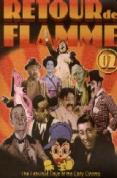 Retour De Flamme Vol 2 - The Fabulous Days Of The Early Cinema | DVD | (27/11/2006)
from £26.98
| Saving you £-1.99 (-8.00%)
| RRP
Retour De Flamme Vol 2 - The Fabulous Days Of The Early Cinema | DVD | (27/11/2006)
from £26.98
| Saving you £-1.99 (-8.00%)
| RRP You do not have to be a film buff to enjoy this second edition of 18 of the rarest short films of the pioneer days of cinema Featured Films: Those awful hats The mystery of the leaping fish Chasing the monkey For her mothers day Kiki the japanese acrobat La Marseillaise Weekend Clo-cloche Play safe Stolen kisses Paris fashion Black and tan Campaign against alcholism Dr Pyckle and Mr Pryde Porky's preview The flight around the world episode 2
![Sally of the Sawdust [DVD] [1925]](/pictures/1097141.jpg) Sally of the Sawdust | DVD | (02/11/2009)
from £4.98
| Saving you £7.00 (234.11%)
| RRP
Sally of the Sawdust | DVD | (02/11/2009)
from £4.98
| Saving you £7.00 (234.11%)
| RRP Judge Foster throws his daughter out because she married a circus man. She leaves her baby girl with Prof. McGargle before she dies. Years later Sally is a dancer with whom Peyton a son of Judge Foster's friend falls in love. When Sally is arrested McGargle proves her real parentage.
 DW Griffith Collection | DVD | (20/03/2006)
from £N/A
| Saving you £N/A (N/A%)
| RRP
DW Griffith Collection | DVD | (20/03/2006)
from £N/A
| Saving you £N/A (N/A%)
| RRP The Avenging Conscience:Nightmarish visions of ghouls and devils highlight this D.W. Griffith silent feature based around Edgar Allen Poe's The Telltale Heart and Annabelle Lee. A young man (Henry B. Walthall) finds himself prevented from wooing the girl he loves (Blanche Sweet) due to the tyrannical edicts of his mean old uncle (Spottiswoode Aitken). The poor lad becomes haunted by a series of visions that convince him to murder this interfering relative. After the murder has been planned and executed the man finds himself haunted by still more visions this time of the fire and brimstone variety. An inquiring detective (Ralph Lewis) adds to the ever-mounting paranoia. Birth Of A Nation: The first part of the film chronicles the Civil War as experienced through the eyes of two families; the Stonemans from the North and the Camerons of the South. Lifelong friends they become divided by the Mason-Dixon line with tragic results. Large-scale battle sequences and meticulous historical details culminate with a staged re-creation of Lincoln's assassination. The second half of the film chronicles the Reconstruction as Congressman Austin Stoneman (Ralph Lewis) puts evil Silas Lynch (George Siegmann) in charge of the liberated slaves at the Cameron hometown of Piedmont. Armed with the right to vote the freed slaves cause all sorts of trouble until Ben Cameron (Henry B. Walthall) founds the Ku Klux Klan and restores order and decency to the troubled land. While The Birth Of A Nation was a major step forward in the history of filmmaking it must be noted that the film supports a racist worldview. Broken Blossoms: This strangely beautiful silent film from D.W. Griffith is also one of his more grim efforts; an indictment of child abuse and the violence of western society. An idealistic Asian (Richard Barthelemess) travels to the west in hopes of spreading the Buddha's message of peace to the round-eyed sons of turmoil and strife. Instead he winds up a disillusioned opium-smoking shopkeeper in London's squalid Limehouse District. Down the street a poor waif (Lillian Gish) suffers horrific abuse at the hands of her boxer father (Donald Crisp). When fortune delivers the battered girl into the Asian's tender care a strange and beautiful love blossoms between them a love far too fragile to survive their brutal environment. Intolerance: D.W. Griffith's biggest most ambitious spectacle uses stories from different times and places to illustrate humanity's intolerance of religious differences throughout the ages. The most visually impressive of these chronicles is the fall of Babylon for which Griffith built the largest sets in Hollywood and filled them with thousands of extras; there's also Christ's crucifixion and the massacre of the Heugenots in 15th century France. The most emotionally involving tale is the modern one about a poor girl (Mae Marsh) whose life is repeatedly ruined by the zealotry of social reformers. The image of a mother (Lillian Gish) rocking her child in a cradle links the stories. At one point angels reach down from heaven to stop soldiers in midbattle making it clear that Griffith intended this follow-up to The Birth Of A Nation as a message of global peace and love Way Down East: Innocent Anna is sent by her poverty-stricken mother to visit rich relations in Boston where she is seduced into a sham marriage by a smooth-talking scoundrel. When she becomes pregnant he abandons her; later the baby dies. Now a social outcast she changes her name and eventually finds shelter at the estate of the sternly religious Squire Bartlett. She falls in love with his handsome son but cannot divulge to him her terrible secret for fear of his father's righteous
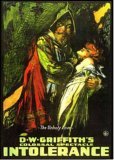 Intolerance | DVD | (16/10/2006)
from £4.10
| Saving you £2.15 (75.70%)
| RRP
Intolerance | DVD | (16/10/2006)
from £4.10
| Saving you £2.15 (75.70%)
| RRP The effects of intolerance are considered in four historical periods: ancient Babylon Judea at the time of Christ sixteenth century Paris and modern America. DW Griffith's follow up to the epic Birth Of A Nation is rightfully considered another masterpiece.
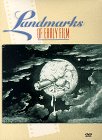 Landmarks of Early Film, Vol. 1 | DVD | (26/11/1997)
from £N/A
| Saving you £N/A (N/A%)
| RRP
Landmarks of Early Film, Vol. 1 | DVD | (26/11/1997)
from £N/A
| Saving you £N/A (N/A%)
| RRP ![James Stewart Boxset [19dvd]](/pictures/1075408.jpg) James Stewart Boxset | DVD | (09/06/2008)
from £N/A
| Saving you £N/A (N/A%)
| RRP
James Stewart Boxset | DVD | (09/06/2008)
from £N/A
| Saving you £N/A (N/A%)
| RRP A box set housing a bevy of brilliant Jimmy Stewart films from the Universal vaults. Films Comprise: 1. It's a Wonderful Life (1946) 2. The Rare Breed (1966) 3. Shenandoah (1965) 4. The Man Who Knew Too Much (1956) 5. Rear Window (1954) 6. Harvey (1950) 7. Destry Rides Again (1939) 8. Vertigo (1958) 9. Night Passage (1957) 10. The Glenn Miller Story (1953) 11. Thunder Bay (1953) 12. Bend Of The River (1952) 13. Winchester '73 (1950) 14. Rope (1948) 15. The Far Country (1954) 16. You Gotta Stay Happy (1948) 17. Vivacious Lady (1938) 18. Airport '77 (1977) 19. Next Time We Love (1936)

Please wait. Loading...
This site uses cookies.
More details in our privacy policy